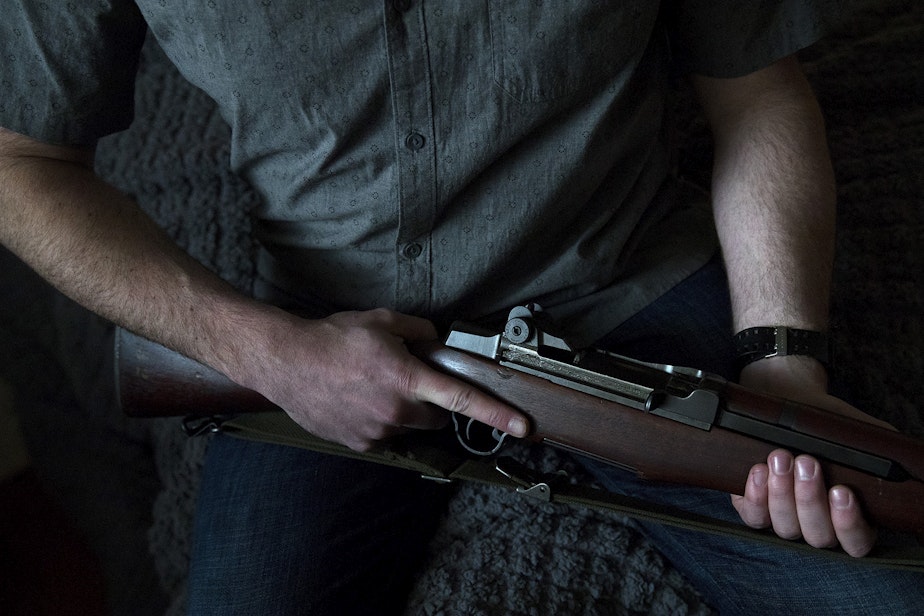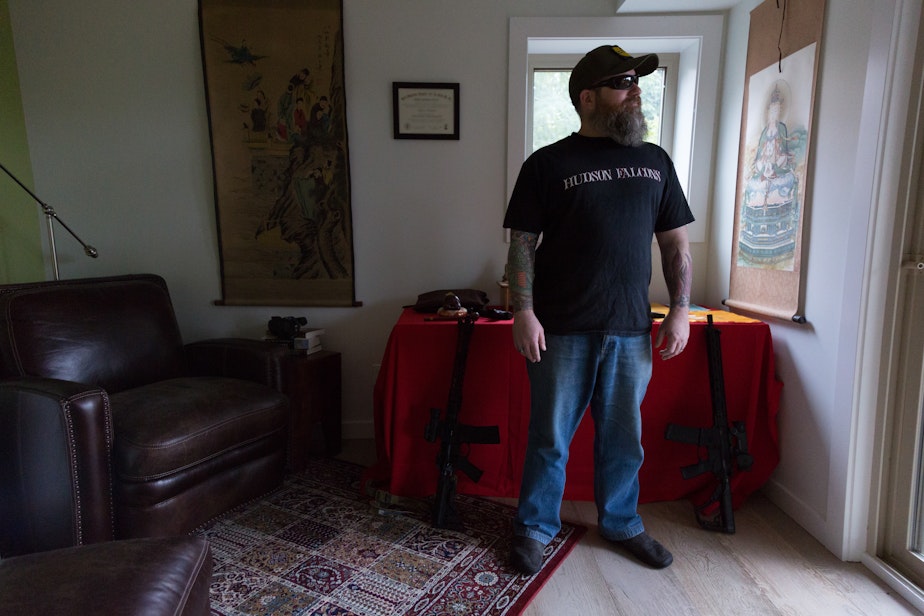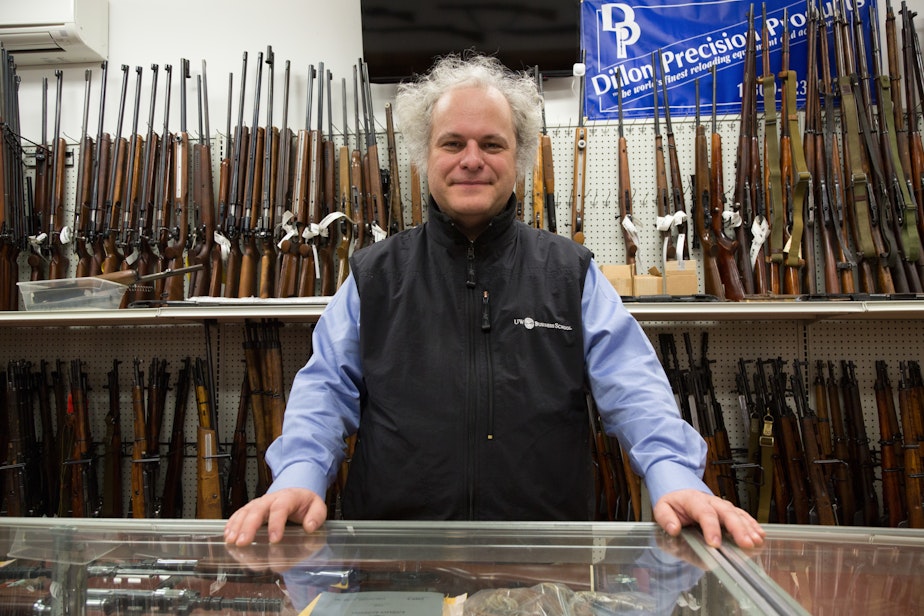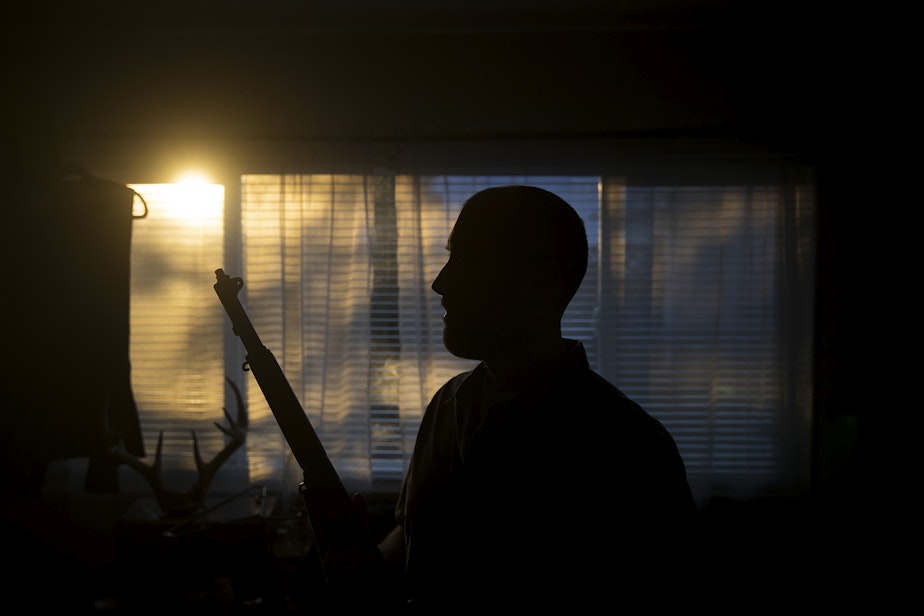Four Seattle liberals on why they own guns and who they're voting for in the primary

Three of the four are leaning toward Bernie Sanders.
Guns are on voting minds.
According to a Gallup Poll conducted last December, about 30% of Americans list guns among five issues as being “extremely important” when it comes to their vote for president.
Because of the high importance placed on gun laws, KUOW explored a different kind of gun owner seldom covered by news outlets: the liberal Seattle gun lover.
We spoke with four local, left-leaning gun owners and asked for their thoughts on guns and how their beliefs will influence their vote.

Sponsored
‘I started seeing swastikas and white-power graffiti.’
Duke Aaron, 49, was first exposed to firearms as a child. He saw the damage weapons could do, growing up in a high crime Brockton, Massachusetts neighborhood with his mother. But he also spent time with his father shooting in the woods in rural Massachusetts.
Aaron became more involved in tactical shooting as an adult for a few different reasons, he said — one being the swastikas and white power graffiti that was popping up in Seattle's Beacon Hill neighborhood, where he lived.
The number of hate crimes reported in Seattle increased to 234 incidents in 2017 from 118 incidents in 2016, according to data collected by the FBI. The most recent data shows that in 2018, there were 291 hate crimes reported.
Sponsored
In response to this, Aaron, a Jewish Buddhist, decided to form the Puget Sound John Brown Gun Club — “an anti-fascist, anti-racist, pro-worker, community defense organization committed to accountable, community-led defense in the Puget Sound,” according to the organization’s website.
You may have noticed the group, armed and protecting members of the LGBTQ community during parades and attendees at other events against alt-right groups that show up.
“I think as a community defense tool, it’s incredibly powerful ... particularly for encouraging far-right lunatics to behave,” Aaron said.
Aaron said his views on gun control are complicated.
“There are lots of reasons a person shouldn't have access to firearms, but I'm not sure that those reasons outweigh the ability of the U.S. government to impose its will on people,” he said.
Sponsored
He reasoned that, one, guns are already here (a Small Arms survey in 2018 found there were more than 393 million civilian firearms in the U.S.); and two, the Pacific Northwest is a mecca of organized white supremacy; and three: “I think we’re a crumbling empire. I don’t think the U.S. government is mature enough to tell humans what to do at this point in civilization.”
He believes restrictions put in place tend to penalize Black people and other minority groups. He said that to prevent gun deaths, the minimum wage should be raised and health care should be improved. He believes most gun deaths are linked with socioeconomic inequities.
“If people are committed to preventing violence, injury and death, they should be putting resources and policy into lifting up humans and not restricting their rights,” Aaron said.
For the presidential election, Aaron said he’s decided on Bernie Sanders.
He made note of Sanders’ evolving stance on gun control. Up until the last few years, he’s pushed a little more conservative on gun control vocalizing his support for an assault weapon ban. Aaron said it’s because the candidate is trying to win the election, and historically he didn't support gun control.
Sponsored
“I can’t chalk up the bigger picture of policies even if I disagree with that one — and I strongly disagree with it. Am I going to steal universal healthcare away from children? It seems like an amoral choice,” Aaron said.
He said it’s the populous areas that drive policy, and that it’s important for voters not to hang their hat completely on wedge issues, when they could be focused on health care, wages and education.
“This one wedge issue really drives a split and the ability to talk about important issues,” he said. “I think this election is going to focus on firearms. It’ll be a red herring and have nothing to do with things that matter to everyday people. Leave our rights alone and focus on improving our lives.”

‘People should be able to own things as long as they don’t negatively impact others.’
Sergey Solyanik is originally from the Soviet Union. He didn’t own guns until 2007, when Solyanik came across an old Soviet military rifle that was featured in the films of his childhood. It was $80 and it was his first.
Now Solyanik, owner of Precise Shooter and a Microsoft developer, has an impressive collection of more than 1,000 guns, mostly World War I and World War II vintage military rifles.
“Like I said, I collect guns for me,” Solyanik said, adding that he enjoys target shooting.
Solyanik said there’s a disparity in the way guns are presented in mass media and the way guns really are.
He said in his experience, guns are not very accurate, and that the zombie films that showcase action stars landing shots in a fully-automatic mode as they run away, is not how things work in real life.
“Maybe if you spend hundreds of thousands of hours at the range training, maybe then you’ll achieve the level of accuracy seen in movies,” Solyanik said.
And he doesn’t believe gun regulation is effective. He said gun laws are created by people who know little about guns for people who know little about guns. And that there’s a reason why these laws have zero support from police.
“They know it can not possibly be effective,” he said.
Solyanik isn’t a fan of Sanders. He surely doesn’t favor Mike Bloomberg, who co-founded and poured millions into Everytown for Gun Safety, an anti-gun violence organization that has backed gun-safety legislation.
Recently, Solyanik started leaning away from the Democratic Party, despite voting for the party in 2018. He doesn’t see himself voting Democrat in 2020. But he also sees no point in voting for Trump in a state like Washington, which swings blue.
He said he’ll be voting third party come November.
‘Half of my local trans friends have a firearm in their house.’
Alex, who is transgender and asked that their last name not be used, was rabidly anti-gun until about a year ago, they said.
They grew up in a liberal California family and weren’t really exposed to guns. They were raised with the concept that gun enthusiasts were all right wing.
In 2019, after their friends attended the Trans Pride Parade in Seattle, they began to question that belief and where they stood on guns. At the parade, attendees came across an alt-right presence, but were provided protection by the gun-wielding John Brown Gun Club.
At the time, Alex said the idea of a “left militia” protecting queer folks was unthinkable to them, and forced them to reevaluate their perspective.
“I had this sort of come-to-Jesus moment,” they said. “I realized the rest of my politics weren’t really compatible with my anti-gun views.”
They started reading about American history, specifically on how Black people in the South used guns to defend against white supremacists. Ultimately, they realized how important the Second Amendment is for minorities, like them, who can’t rely on the state for protection.
Alex said they’re concerned about gun control laws and their potential disproportionate enforcement in urban areas and on urban poor populations.
They equate it to the the War on Drugs, which strengthened punishment against low-level drug offenses, and disproportionately impacted people of color.
“You can’t expect social justice to bloom from the fruits of the poison tree of our criminal justice system,” they said, nodding to the racial and ethnic disparities within the country's more than 2 million prisoner population.
Alex said they don’t view the argument on gun control being about them, but rather about their community. Being trans, with mostly trans friends, they often hear about the violence against LGBTQ people.
“I can’t go a week without hearing from someone that slurs were shouted at them getting on a bus or Instagram stories about trans people assaulted or killed,” Alex said.
To help teach others, Alex participates in queer range days. Alex, being a fairly experienced shooter, educates newbies on firearm safety and how to properly shoot a handgun at the range.
Alex repeated that owning a gun wasn’t about them individually, “it was more about my whole community.”
On politics, Alex said the Overton Window has expanded, and there’s no room for a Democrat without a gun control agenda. But overall, their politics, generally left-leaning, best align with Bernie Sanders. The Overton Window describes the range of ideas the public is willing to accept. Anything outside of this frame, is deemed too radical to digest.
“A lot of people’s views are more nuanced, but the tone of debate does not really allow the voicing of nuance,” Alex said.
They said the agenda of democratic socialism is the best suited to address what they believe are the root causes of gun violence: poverty, economic inequality, legacy of institutionalized racism, housing policy.
“I have a suspicion, not really rooted in any kind of fact, just a hunch that (Sanders’) views on guns perhaps are a bit more moderate, but again he just has to move with the Overton Window,” Alex said.

‘I’m hooked on the history and the challenge of marksmanship.’
Josh Young had no interest in firearms at all until a friend was able to get them at a reasonable price. At 18, he bought his first gun and instantly became hooked on the history aspect of guns, and the challenge of marksmanship.
This interest turned into into collecting vintage guns. The defense aspect is secondary for Young, although he admits a level of safety comes from having a gun in his home.
One of his more prized guns is a 1944 Remington Rand M1911A1. He won it in a lottery, after he and 20,000 other gun enthusiasts entered to purchase the gun. The lottery was recently facilitated by the federal government as a way to surplus out thousands of old Army handguns, he said.
Young is not opposed to gun control. He said it’s important to keep guns out of the wrong hands. However, he wasn’t in support of the passing of Initiative 1639, which categorized semi-automatic rifles as assault weapons.
Young said since the 1994 federal Assault Weapons Ban expired in 2004, he watched as the industry exploded with what people have deemed “scary guns,” due to the looming threat of additional bans on this type of weapon. And people scrambling to buy AR-15s.
He said that he possesses his own “scary-looking black rifles” with high-capacity magazines.
“I’m not saying they're not dangerous," Young said. "They are dangerous in the hands of the wrong people, but typically the wrong people aren't using those types of guns. Most of what’s used in crimes are small handguns.”
He said the appropriate way to curb gun violence is for additional wait periods and background checks. And he’s not opposed to waiting a couple of days. It’s not that big of an inconvenience to him, but he does have concerns with how far gun laws will go and if they’re effective against gun violence.
“In a perfect society, defensive guns wouldn't exist ... I personally would like to have some kind of means to defend myself equal to the means at which someone can attack me,” Young said.
Young considers himself mostly a liberal Democrat, but said he believes the Democratic Party is misguided on gun laws.
He said Democratic candidates should be focused on what he views as more pressing issues: healthcare, campaign finance reform and wealth inequality.
“I kind of see it like the Republican Party’s views on abortion,” he said, adding that it’s an issue picked up and adopted as one of the party's oppositional platforms used to rally voters.
Young caucused for Bernie Sanders in 2016, and believes in his platform, although he wonders whether he’ll be able to achieve his goals of Medicare for All and lowering the cost of post-secondary education.
Young graduated from college with large college debt, which he said has held him back. He also attributes life stress to the high cost of health care.
Young said he does not consider himself to be a one-issue voter. If he was, he would not be voting Democrat.

